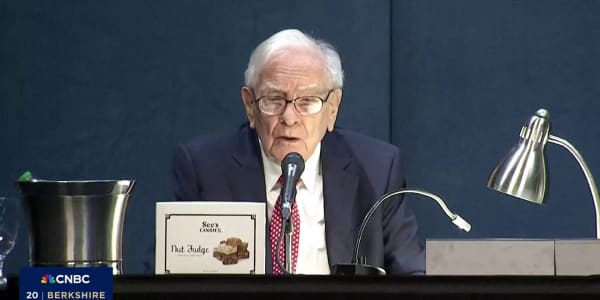Like most busy professionals, Janice Marturano was working long hours, putting out fires and dealing with nonstop demands not only inside the office but outside as well. Vice president of public responsibility and deputy general counsel at General Mills, the then 43-year-old was married with school-age children, president of the board for a large nonprofit and the daughter of aging parents.
"I was a 21st-century juggler," she said at CNBC's @ Work Talent + HR Summit on Tuesday in New York City.
In 2000 Marturano received a call from her CEO asking her to lead a team of people to get a multibillion-dollar deal approved by the FTC, she said. The deal, intended to take six months, dragged on for 18. "The team and I were working seven-day weeks, and I sent my family away twice without me. Six months in, my mother passed away. I had no time to grieve. I do what busy professionals do; we play hurt, push it away. Six months after that, my dad also passed away. The deal was over, but I was profoundly aware that I had lost something."
At the advice of a physician friend, she decided to take some time off from work to attend an intensive retreat for executives in Arizona called the Power of Mindfulness.
Just what is mindfulness? It is the art of being fully present and aware of where we are and what we're doing, without reacting or being overwhelmed by what's going on around us. Something most people in this 24/7/365 world find impossible to do.
"It was one of the hardest things I've ever done. I had been running 150 mph for so long, I wasn't even aware of how far into autopilot I had gone. The idea of stopping was a lot like hitting a brick wall," she said.
But it was that pause, that deep breath, that step back that changed her life. There, she learned that through meditation, reflection and personal pause — that moment in the day when you notice the chaos and intentionally choose to pay attention — professionals in every level of an organization can train their mind to cut out all the noise and distractions and be better able to make good decisions both at work and in life.
"Without it," she said, "we are asking them to do the impossible."
Six years later, in 2006, Marturano founded the Institute for Mindful Leadership and wrote "Finding the Space to Lead: A Practical Guide to Mindful Leadership." Using the institute's mindful leadership curricula, she has trained business leaders and employees from more than 60 organizations around the world, most recently at the World Economic Forum in Davos, Switzerland.
According to Marturano, below are the four fundamentals of professional excellence that can be cultivated through mindful leadership training.
1. Focus
Distractability loses about 30 percent of our productivity, said Marturano.
"When we are disconnected, when our mind is somewhere other than our body, people feel it. And when we're fully there, they also feel it," she said.
Even when we want to pay attention — it's in a meeting, or to our children or just to get through a report we're reading, she says, our mind flits away. "We can be sitting in a meeting and realize at some point that we haven't heard the last 10 minutes. Our mind has become conditioned in the year 2019 to being constantly distracted by external things, like our phones and our computers and laptops — all kinds of things that buzz at us. Focus is about learning to notice when our mind jumps away from where we want it to be. When we practice with a basic meditation, she said, we can bring our attention to the body sensations.
"Feel your feet under your desk and just pay attention to what you notice there—their warmth, their coolness, the touch of your shoes, socks. And as soon as we start thinking about our 11:00 meeting, bring yourself back to the soles of our feet. Every time we redirect and bring our attention back, it's like doing a rep, like when you lifting weights to build muscle. We are strengthening our ability to aim and sustain attention."
2. Clarity
"In the constant busy-ness of business, you may often find yourself moving from one subject to another so quickly that you don't see what's in front of you. You only see what you expect to see, what you hope to see, or what you want to see," said Marturano in her book "Finding the Space to Lead."
That's where clarity comes in, she said. Mindful leadership training develops the ability to see clearly the issues and the opportunities so professionals and leaders take the time to choose how to respond rather than simply to react. Marturano added that sometimes doing nothing at all can actually be the wisest decision.
Marturano also said that gaining clarity not only refers to the events around us but also to the way we see ourselves. Noticing how we react in certain situations could lead us to make some important discoveries. Realizing that our conditioning and education may be filtering out some of what we need to see could lead to important behavioral changes for the better, she said.
When we are disconnected, when our mind is somewhere other than our body, people feel it. And when we're fully there, they also feel it.Janice Marturanofounder and executive director, the Institute for Mindful Leadership
"Be able to go to a meeting and notice how you are arrive at that meeting. Am I arriving with an openness and a curiosity? Or am I closed and I've already decided what I want, regardless of what the facts say?" Marturano said.
"Most people spend some part of their day in a meeting, and we've seen times when the lead person listens to the meeting and most of the comments say X but the lead wants to go to Y, so the one comment that says Y is the only comment the leader hears," she said.
3. Creativity
"The creative mind craves space," said Marturano, adding that creativity is key in order to be successful in life and work.
"What we understand from neuroscience is that in order for our brains to be creative, we need spaciousness," she said. "But the reality of living today is that there is no space. We're constantly doing. Our days are busy from the minute our alarms go off. And if our mind is full of our to-do lists and the next call and the next Boy Scout meeting, there is no spaciousness. So there's no room for our brains to put things together in new and novel ways."

Marturano says it is possible to cultivate spaciousness in the midst of busy days by learning to take time to reflect. "Reflection isn't sitting still and staring out the window. Reflection is discipline. That allows people to cultivate space for creativity."
4. Compassion
The very best leaders have some things in common: They have bright minds, they have warm hearts, and if they exist anywhere on their to-do list at all, they are at the very bottom," said Marturano.
She emphasizes the importance of self-compassion and taking time for yourself. "We can't take care of anyone if we fall apart."
She added: "We often go into this autopilot mode to get through the day, and we don't know how to cultivate resiliency. And when we don't, it's not sustainable, and that's when we end up with an epidemic of people who become disengaged or ill from stress-related illnesses."






